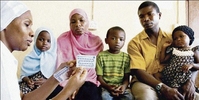
A family recieves family planning advice at Kivunge Hospital, Zanzibar. Contributed
"PEOPLE CAUSE climate change. People are affected by it. People need to adapt to it. And only people have the power to stop it." This is the global message embodied in the the United Nations Population Fund (UNFPA) State of World Population Report 2009, which was launched on Wednesday, November 18.
Under the theme 'Facing a Changing World: Women, Popula-tion and Climate', the UNFPA has placed emphasis not only on the overall impacts of climate change and adaptation strategies, but fundamentally, on how individual behaviour can undermine or contribute to the global efforts to halt the process.
"The only lasting solution will be one that puts people at the centre," says Thorya Obiad, executive director, UNFPA.
Outlining the UNFPA's fresh approach, Obiad explained that the bottom-up approach that is based on people's knowledge of their immediate environment will offer more effective solutions to the reduction of greenhouse gas emissions and adaptation strategies.
climate change
"The cause we champion - promoting the right of every woman, man and child to enjoy a life of health and equal opportunity and help reduce poverty - are also the causes that are relevant to climate change," Obiad writes in the foreward of the publication.
Findings of the study, which are supported by World Bank data, show that climate change has the potential to roll back the progress made to achieving the Millennium Development Goals. These include "water scarcities, intense tropical storms and storm surges, loss of glacial meltwaters for irrigated agriculture, floods, food shortages and health crises".
Poor households and vulnerable groups, such as the elderly, women and children, will bear the brunt of the impact, the report says.
"Women - particularly those in poor countries - will be affected differently from men. They are among the most vulnerable to climate change, partly because in many countries, they make up the largest share of the agricultural, workforce, and partly because they tend to have access to fewer income-earning opportunities."
The anticipated local launch of the State of the World Population Report 2009 takes place on Friday November 27 at the Terra Noval All-Suite Hotel.
The UNFPA has a subregional office in the Caribbean which serves 21 countries and overseas territories in the English- and Dutch-speaking Caribbean. The fund, which has been operating in the Caribbean since 1969, provides support to regional governments, non-governmental organisations and civil society.
The current UNFPA Country Programme in the Caribbean seeks to contribute to the reduction of poverty, and to improve the quality of life of the people of the region. It does so by promoting sexual and reproductive health and rights, gender equality and equity, and by integrating population analysis into development planning.
Under a reproductive-health commodity-security programme, the UNFPA facilitates training of health-care professionals and other key partners to develop effective action plans, forecast commodity needs at the country level, identify underserved populations, and develop the appropriate mix of strategies to ensure a steady and dependable supply of commodities and services.
lovelette.brooks@gleanerjm.com